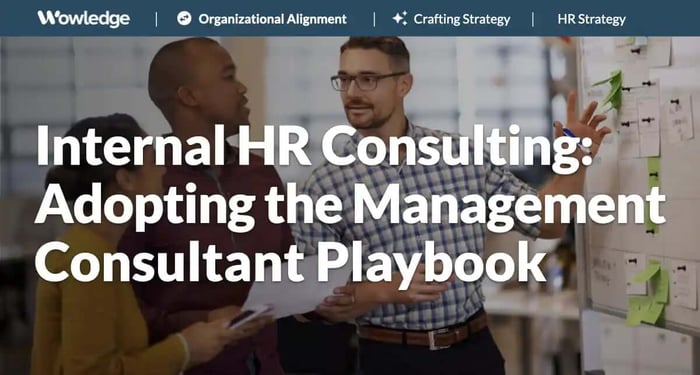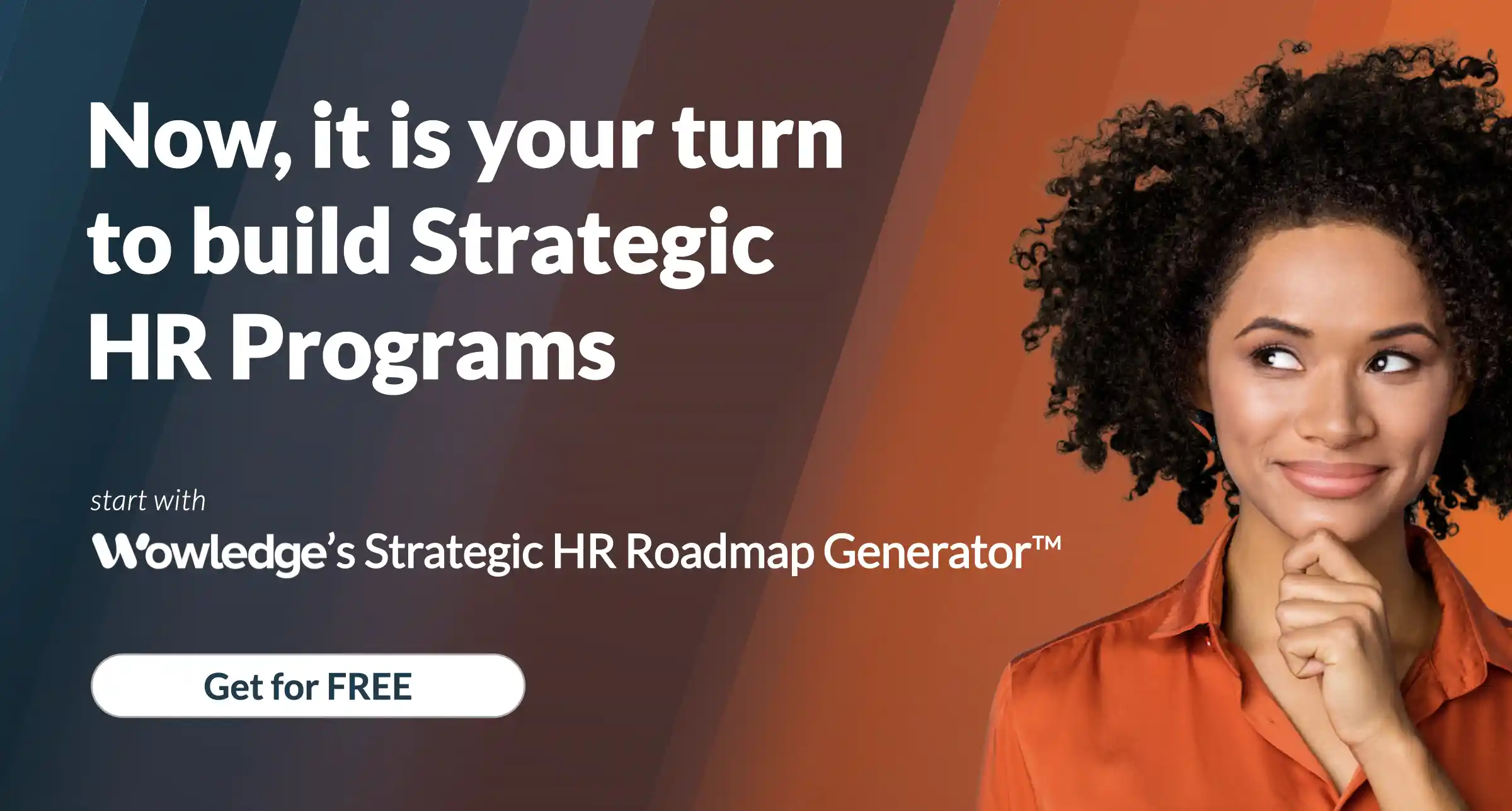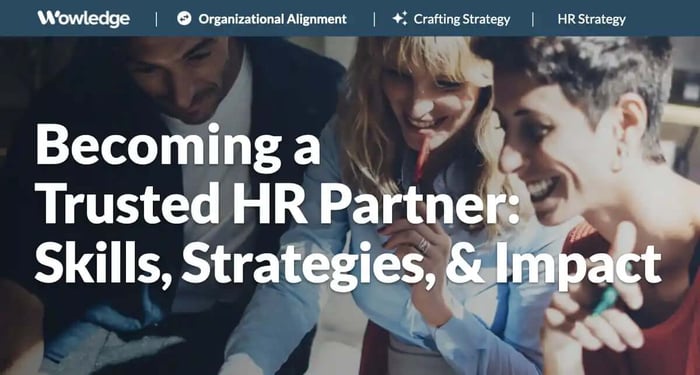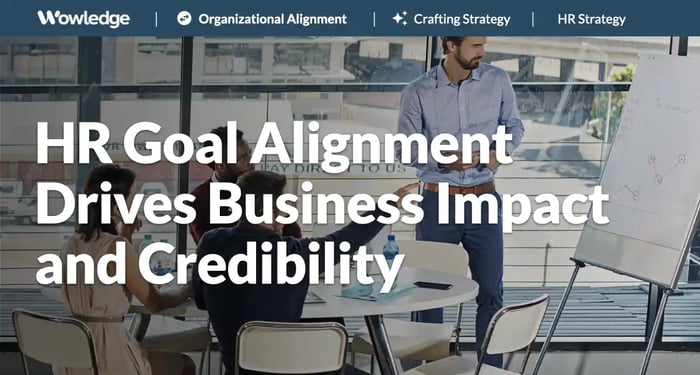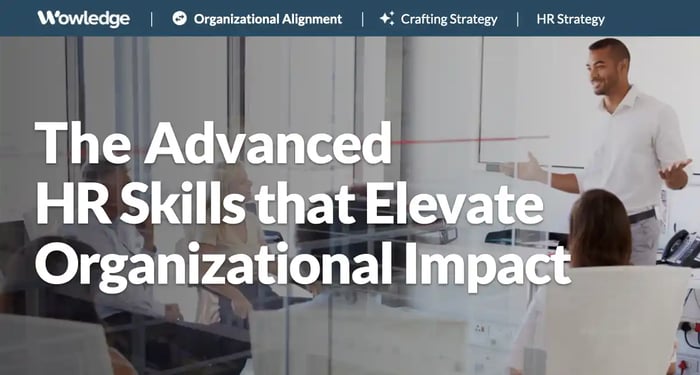Table of Contents
So much of being a business-savvy, strategically aligned HR professional comes from the skills and capabilities learned, honed, and practiced in what Dave Ulrich originally referred to as the “strategic business partner” role. That role can be exercised by professionals in any HR function —from HRBP to generalist, and from the Center of Expertise (COE) or shared services (HRSS) leader to specialist. What is required is a combination of skills and methodologies that bring disciplined, structured approaches to capability enhancements and problem-solving to improve the business outcomes of their “internal clients.” Those skills and methodologies are the same ones that management consultants use to create value for their external clients, making effective internal HR consulting a well-established and achievable goal for CHROs and their teams.
The large, global management consulting firms—think of McKinsey, BCG, Bain, Deloitte, Accenture, PwC, EY, and KPMG exist to help their clients make substantial performance improvements by identifying and solving problems related to issues of operational and financial performance, competitive advantage, and navigating change. They do this by providing expertise and insights into the root causes and nature of shortcomings and opportunities, offering advice on organizational governance and decision-making, and guiding the design and planning (if not execution) of operational improvements.
At their best, modern HR functions operate in much the same way by bringing internal HR consulting methods and skills to the forefront to build and sustain a strategic HR function. The focus and work of an in-house HR consulting team continually target correcting operational shortcomings and identifying opportunities to enhance the strengths and successes of its internal clients’ outputs.
Regardless of the size of an HR organization, internal HR consulting can be conducted by a single practitioner, members of a small team, or across many teams, functions, or locations. The fundamentals are the same, with a combination of structured approaches and the application of specific skills that together enable a consistent impact on business, operational, and talent outcomes.
Effective HR consulting approaches
The actions required to consistently achieve a desired impact on a business and its operations are built on a solid foundation of objective knowledge honed by years of application experience. Leading consulting firms depend on frameworks grounded in sound, proven principles of client engagement, leading practices, and future-looking solutions. They leverage academic and organizational research, expert judgment and opinion, and benchmarks and trends to uncover the conditions that create an issue, as well as the solutions others have used to manage them effectively. In a similar way, internal HR consulting approaches leverage evidence-based HR (EBHR) to create their own viewpoints on potential drivers of an issue and solution options for consideration.
At the same time, internal HR consulting often leverages proven, well-established approaches that bring discipline and rigor to these types of engagements. While numerous elements within each of these approaches overlap, each one provides a structured methodology that yields repeatable, reliable outcomes in issue assessment and solution development.
Organization Development (OD)
Organization Development is a long-standing methodology used by learning and development (L&D) professionals to improve individual, team, and organizational performance. It focuses on the “total system” (or ecosystem) in which the underperformance is occurring. It examines the elements that drive or influence organizational performance, including leadership direction and behavior, process design, employee skills and motivation, enabling technologies, and customer requirements. It emphasizes, but is not limited to, people-based solutions such as leadership development, coaching and mentoring, team building, training, strategic planning, and reorganizations. OD also examines and addresses infrastructure and workflow enhancement opportunities such as process improvement, technology configuration and implementation, and policy or procedural changes.
Performance Consulting
The "Performance Consulting" methodology, also pioneered and leveraged by L&D professionals, is a suitable approach for more targeted issue resolution for narrower, more tactical performance shortcomings. It is an approach well-suited to the work of local HR managers, generalists, or specialists. It requires engagement with functional leaders to understand the individual or team performance shortfalls and define the needed improvements. While the process can be conducted more quickly than a traditional OD effort, it still relies on data collection and analysis to better understand the issue and its possible causes. Individual coaching, team building, process improvement, training, and role and responsibility clarification are common interventions.
Human-Centered Design
Human-centered design, also known as “design thinking,” is a methodology that considers the needs, preferences, and requirements of the end users of a process, program, policy, or service. It engages employees in describing how they use or interact with (“experience”) the targeted functionality in a step-by-step way, and in identifying their “pain points” or steps that create confusion or irritation. The idea is to use their insights to make the targeted experience simpler, less complicated, less time-consuming, or less frustrating. Commonly used in product design, systems, and user interfaces, its popularity has expanded to HR and business operations applications. Beyond problem identification, it engages targeted employees in the redesign and review of rapidly developed improvements over multiple design iterations until a suitable solution emerges.
Process Improvement
Process improvement is a series of formal, structured approaches to evaluating and redesigning work and administrative processes, or workflows, that originated in manufacturing and production environments in the 1950s. Well-known process improvement methodologies include Lean, Agile, Six Sigma, CPI, TQM, Kanban, and Kaizen. They rely on well-defined steps, many of which have their own package of tools, steps, and analytics for defining a challenge, mapping the process, analyzing each process step for poor design or inefficiencies, clarifying a root cause, redesigning the approach, and using metrics and reporting to monitor the updated process, product, or system.
Other supporting HR consulting methods
In addition to the primary approaches, a few time-tested approaches serve as reliable and supplemental partners that significantly enhance the likelihood of success for any internal improvement or issue-resolution effort. These require additional knowledge, expertise, and skills that can be held by HR practitioners, their partners from other internal functions (e.g., finance or IT), or by external providers (e.g., consultants, HR knowledge platforms).
- Meeting the client where they are. This concept is used by many of the most effective consultants and firms, leveraging a maturity-based approach that considers the organization’s current state of readiness for different levels of change. It builds a solution or capability gradually within a timeframe that supports adoption at a pace and level the client can accept. This balances a natural interest in installing industry-leading practices with the reality of human capacity to accept and adopt change. A longer-term, more iterative approach that starts with implementing foundational practices that can be built upon creates a continuous cycle of more incremental improvements.
- Strategic change management. With a similar understanding of human capacity and readiness to accept and adopt new behaviors, standards, and approaches to performing work, strategic change management requires an assessment of the extent of change to be effected, the skills and readiness of those who will be impacted, and the steps that are required to prepare, educate, and support them through full adoption. It involves planning, explanations, communications, training, and continuing support to ensure that the change takes hold with everyone whose participation and use are essential.
- Business case development. Creating a business case is an essential element of both structuring a logical plan of action and gaining leadership buy-in and support for any in-house HR consulting effort. These are used up front to plan and design any proposed intervention aimed at enhancing operational performance or resolving an issue or shortcoming at any level of an organization. It uses financial, analytical, and quantitative means to assess and explain a trend or occurrence, evaluate alternative solutions, and propose a plan of attack for management engagement and approval.
- Automation and digital transformation. Many internal HR consulting efforts involve guiding the organization through digital transformation by introducing new technologies, ranging from career mobility platforms to candidate testing and assessment systems to AI-driven or augmented employee listening capabilities. Just as the automation of payroll and time tracking, employee benefits enrollment, and performance evaluations required new expertise for HR practitioners, the ongoing introduction of new advances requires greater knowledge and expertise.

High-priority HR consulting applications targeted at organizational impact
The most impactful HR consulting focuses on improving organizational and individual effectiveness. As such, it is targeted at achieving specific business outcomes rather than individual HR processes or practice enhancements. Examples of effective HR consulting efforts include those related to outcomes such as:
- Commercial: market share, sales, customer success
- Financial: profitability, expense management, headcount optimization
- Operational: process optimization, organization design, cross-functional collaboration
- Talent: hiring quality, retention, skills deployment, capability development, change readiness, and adoption
Note that even the talent outcome examples are precursors and people management requirements that drive more efficient and effective commercial, financial, and operational outcomes. Understanding (objectively) how HR actions drive business outcomes is an essential element of effective HR consulting.
Opportunities to create highly impactful HR consulting initiatives and projects are plentiful and depend on any given organization’s mission, priorities, and challenges in achieving them. However, some prime examples can inspire the CHRO or HR leader’s thinking and planning.
Productivity and performance
This is a core element of HR’s value proposition, which is too often discussed without an accompanying implementation plan, as it requires a high level of knowledge and expertise in a business unit’s or function’s operations, workflows, ecosystem dependencies, and supporting technologies. However, internal HR consulting initiatives can focus on workflow and process improvement, team effectiveness, cross-functional collaboration, leadership and management effectiveness, or job and organization design.
Employee engagement and employee experience (EX)
Consulting efforts targeted at improving engagement (overwhelmingly demonstrated to increase profitability, absenteeism, and turnover), and employee experience (shown to increase revenue, profitability, and competitive outperformance are common areas of in-house HR consulting for many HR teams. When designed using structured and objective situational assessments and solution design, their credibility and impact can be substantial. Targeted improvements in skill development, internal mobility, managerial effectiveness, human-centered process redesign, and technology enhancements are strong candidates for internal HR consulting efforts.
Workforce planning and deployment
With the rapid advancement and adoption of new and emerging technologies (e.g., AI, robotization) that are impacting how work gets done across industries, strategic workforce planning has become an essential tool for understanding and projecting the volume and capability requirements of organizational staffing. Consider the opportunities for business impact that structured and business-aligned employee mobility, skills development, and talent allocation offer. For example, McKinsey research found that organizations that frequently reallocate and assign high performers to strategic priorities deliver more than two times (2.2X) the total shareholder return vs. the competition. Internal HR consulting can center on critical workforce segmentation, talent strategy, and workforce mobility strategies and tactics.
Culture development and management
In times of increased market and socio-political volatility, shifts in the employer-employee compact, and workforce instability (e.g., layoffs), organizational culture faces inevitable changes that require attention. As leaders come and go, functions are resized, employees are deployed or reduced, and work processes are redesigned, the impact on team, function, and business unit dynamics is often substantial. Internal HR consulting opportunities often start by leveraging employee listening and HR analytics to sense trends and changes that either support or undermine alignment between culture and the business mission, values, and priorities. Consulting efforts often leverage methodologies such as Organization Development (OD) to assess the trends, identify root causes, and design solutions that drive improved organizational performance.
Leadership and management development
Managerial effectiveness is reported to be at record-low levels, and given its direct relationship with operational performance, productivity, and employee engagement and retention, this is a natural topic for internal HR consultative efforts. Similarly, leadership tenures are shrinking, transitions are becoming more commonplace, and the rate of leadership toxicity is at alarming levels, creating the need to prioritize HR support and interventions. Effective HR consulting interventions can focus on new leader onboarding, managerial coaching, team building, peer learning and support, 360-degree performance assessment, and remediation.
Internal HR consulting skills to develop
Establishing internal HR consulting as an organization-wide capability and differentiator requires defining the skills used to support the use of approved methodologies and approaches. Regardless of the selected approach, the skills required to execute it effectively should be defined and deployed within an integrated talent management structure, such as by updating job requirements, training and development resources, performance standards, and advancement criteria.
The focus should be on updating the HR capabilities that will most impact the business and articulating them into two categories: foundational and differentiating. The core, or “foundational” skills are those that every HR team member should learn and apply in their consulting work. The advanced, or “strategically differentiating,” skills are those that senior, higher-level contributors who frequently engage in consultative activities should exhibit and regularly act on in their HR consulting efforts.
Foundational consulting skills
- Establishing trust and credibility with internal “clients” for whom the in-house HR consulting effort or project is being conducted.
- Listening and communications skills relate to effectively (e.g., “active”) listening for understanding and providing feedback on line leader and manager concerns and insights.
- Critical thinking means effectively processing and analyzing facts and evidence to form reasoned judgments and make well-informed decisions about a situation or solution-defining path forward.
- Business and operational understanding is defined as an awareness of how a business operates, delivers products or services, and succeeds or falls short of its goals. The more detailed this understanding, the better one can evaluate trends and issues, identify root causes, and propose potential solutions.
- Coaching and influencing are skills essential to providing guidance and support to client managers and leaders as they process and consider the perspectives and insights from the HR professional.
- Evidence-based HR (EBHR) is both a skill set and an approach that relies upon objectivity, data, and facts in internal HR consulting efforts. This replaces intuition with data-driven insights and includes skills in external research, internal and benchmark data analysis, evidence evaluation and comparison, and solution generation and evaluation.
Strategically differentiating consulting skills
- Strategic and integrative thinking are advanced skills related to being able to understand the broader (external) context of an issue, how it relates to or influences organizational objectives, and how concepts from different fields of study (e.g., finance, engineering, HR functions) can be integrated to create novel and responsive solutions.
- Design thinking or human-centered design are methodologies that engage internal clients and end-users in the exploration of issues and their causes, pain points, and the generation of solution options, rapid prototypes, evaluation, refinement, and ultimately, solution championing and implementation.
- Project management skills support the structured development and implementation of organized and detailed plans, milestones, roles and responsibilities, timelines, and budgets that support coordinated efforts and successful solution delivery.
- Change management is a set of skills related to the planning and execution of structured methods for the design, delivery, and measurement of activities that promote and accelerate the acceptance and adoption of any organizational improvement or alteration. The skills relate to audience segmentation and needs assessment, communications and training development and deployment, and engaging influential voices to champion the value and benefits of the changes.
- Facilitation skills are essential elements for engaging leaders and their teams or organizations in jointly-owned processes that support any internal HR consulting initiative. These are critical for success in training, team building, employee listening, and solution design sessions, as well as participation.
- Innovative and creative thinking are hallmark skills and abilities that support the identification, creation, and actions for tailored applications coming out of any internal HR consulting approach. Other related skills include resourcefulness, adaptability, agility, and flexibility in thinking, analysis, insight processing, and solution development.

Bringing internal HR consulting to life as an organizational capability
Making internal HR consulting a way of life establishes it as a defining characteristic, a cultural differentiator, and part of the HR brand. It can be embedded in the HR operating model, with clear definitions, approaches, and performance expectations that are adopted and shared across HR functions, roles, and strategies. A seven-step model is recommended:
- Create an HR consulting strategy that a) defines the approved methodologies that the teams will be trained in, b) establishes how team members will be indoctrinated, developed, and managed in their successful use, and c) sets expectations, requirements, and guidance for their use as consulting efforts are initiated.
- Establish standard methodologies that encourage a disciplined and scientific approach to consultative relationships and credibility-building, root cause identification, client partnering and engagement, business case development, measurement, and design thinking.
- Train and develop staff members on methods, tools, data-driven assessments, and applications of the approaches. Encourage and foster the growth of interpersonal skills related to trust building, influencing, communications, and change management.
- Hire properly skilled HR professionals who can act as role models and mentors for others, and who have experience and track records in delivering business and operational impact through in-house HR consulting behaviors and practices.
- Reward and recognize those who adopt and demonstrate the desired skills and approaches, regardless of role or level. Use internal HR consulting skills as criteria for promotions, lateral mobility, and merit increases. Make public examples of those who use the methods properly and achieve the results, such as through CHRO innovation or impact awards.
- Establish a supporting ecosystem, including knowledge HR consulting platforms (e.g., Wowledge) with how-to guides, playbooks (step-by-step), best practices, lessons learned, tools, and collaboration capabilities for sharing among peers across business and functions. Create a continuous learning system and programs with eLearning, workshops, regular “tips” and reminders, and group coaching sessions.
- Adopt and encourage “freedom within a framework” that boosts autonomy, creativity, and innovative applications of the approaches and solutions based upon leading practices and thinking. Require critical steps, but leave room for reasonable variance and tailoring to meet unique local needs.
Relevant Practices & Tools
Advanced Change Management Practices to Enable Large-scale Organization Transformations
Not all change initiatives are created equal. Highly complex change initiatives require a higher-touch approach to effectively prepare the organization... more »
Applying Organization Development Principles to Uncover Opportunities for Improving Organizational Performance and Health. >
Organizations are constantly in flux, with multiple change efforts underway. HR is being called upon to facilitate more and more of these endeavors, using Organizational Development tools, methodologies, and frameworks... more »
Mapping the Organizational Landscape to Establish the Current State and Future Needs. >
Surveying the organizational landscape to identify talent needs, workforce shifts and strategies, and organizational design and operating changes is critical to driving transformation... more »
Assessing Current and Future Skills-based Requirements and Gaps to be Filled. >
Bringing workforce planning into a skills-based level of assessment requires cataloging the skills required by the positions to be included, identifying the availability of those skills in the current workforce, determining future needs, and creating a gap analysis to reveal the requirements for subsequent skills acquisition and development... more »
The Performance Consulting Assessment Tool: Uncover Workforce Challenges and Supporting Data for Learning and Development Solutions. >
The Performance Consulting Assessment Tool documents conversation(s) with functional managers who are facing specific workforce challenges that the learning & development team members then use to create solutions for those managers... more »
